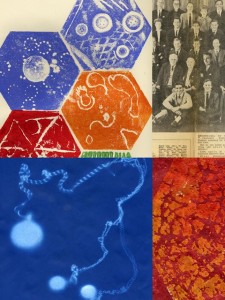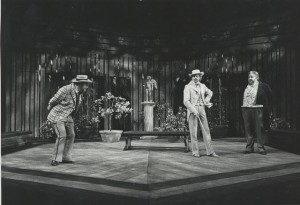
Earlier this year I attended a conference called Artists in the Archive; thinking about the possibilities of artistic responses and interpretations to archival material. This is something Pass It On is really interested in exploring further and it was fantastic to see some really exciting examples of this from across the country.
The archives of Chichester Festival Theatre are rich with stories of the past 50 years; the triumphs and challenges of its theatrical life. The overarching narrative is one of overcoming great difficulties and achieving the impossible, indeed the founder; Leslie Evershed-Martin’s two books about the Theatre are called “The Impossible Theatre” and “The Miracle Theatre”. It’s an inspiring story of what creativity and vision can achieve and one that certainly does, and hopefully will continue to, inspire others for years to come.
For Pass It On, we are in the current privileged position of being keepers of the Theatre archive, held at the West Sussex Record Office. With this comes the responsibility to not only care for, but also share this story as much as we can. The possibilities for this are very exciting and we can certainly think of no more fitting way than to encourage further creative and artistic responses, inspired by the stories of the Theatre’s past.
There is a wonderful saying that exploring an archive “is like eavesdropping on history” and the creative potential of such eavesdropping is huge. Archives contain many new and undiscovered stories but the challenge can be to discover and interpret these in engaging ways. Art can be a really successful way to make meaning out of the fragmented documents of an archive and communicate this more widely. The challenge can however be encouraging people to feel like archives are open for them to explore, and unlike eavesdropping, that they are allowed and should be doing it.
Archives, as repositories of the assumed ‘official history’ of an organisation, are undoubtedly a place of power and authority. This can put people off feeling free to explore and piece together their own stories. However, it also means that archives can be places of empowerment when people are engaged to have their own responses, particularly in new creative ways.

This is one of the driving principles behind a new initiative from the National Archives called Archiving the Arts which is encouraging new approaches to open up the archives of Arts organisations. Art and creativity can allow connections at a personal and emotional level, bring stories to life in new ways, and inspire curiosity by taking ideas in new and unexpected directions.
The creative environment of Chichester Festival Theatre is the perfect place to experiment and explore new ways of interpreting and accessing archives. Already the story of the founding of the Theatre has inspired the Pass It On play by Amelia Mlynowska, artwork created by families from local charity PACSO, currently on display around the Theatre hoardings, and archival material is now being used to inspire Youth Theatre performances this November. This is just the beginning and over the next two years of Pass It On, and beyond when the archive becomes publicly accessible, we hope the archival material of the Theatre will spark and inspire much more creativity and exploration.


